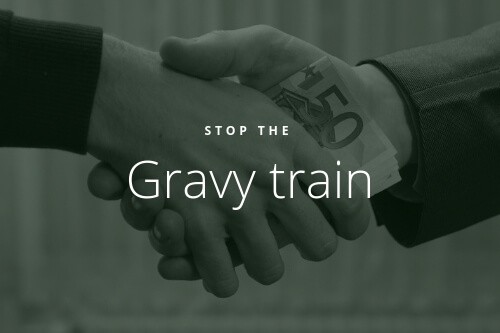
YouTube / iTunes / Spotify / Radio Public / Pocket Casts / Google Podcasts / Breaker / Overcast
Listen to ArtisanEnglish.jp posts & lesson intros here.
WotD: Gravy train
All aboard!
All aboooooooard!
Welcome, ladies and gentlemen, to the gravy train.
Keep in mind this is the gravy train – not a crazy train.
Yep, by getting on this train, you are on your way to making easy money.
I mean, by the time you get off, you will be Mr. or Mrs. Moneybags.
So, what the heck is the gravy train?
Well, it’s usually a dishonest way of quickly making tons of money through corruption, graft, and under-the-table deals.
One of the best ways to get a ticket for this train is to become a construction company and win government contracts.
Military ships, bridges, emergency disaster reconstruction and even fuel suppliers are all on the lucrative gravy train of government contracts.
Over the past few years, there has been scandal after scandal after scandal concerning companies making vast amounts of money off government contracts.
Of course, there was overcharging for reconstruction after the devastating tsunami in Tohoku, and more recently, there was the price-fixing fuel scandal around the fuel supply for the Japanese Coast Guard.
I’ve also heard something about the contract to provide English language lessons to Tokyo-to workers.
Apparently, workers who have nothing to do with the Olympics attend classes paid for by the government in preparation for the Tokyo Olympics.
Although some train lines in rural Japan have been discontinued due to low ridership, the gravy train is chugging along just fine.
To add my own two cents’ worth here, I’d say it’s more than likely overloaded with dead wood.
We, or rather the Japanese people, need to demand that the government stop overspending on services of all kinds.
The gravy train needs to be derailed and derailed today.
With a rapidly ageing society and decreasing birthrate, there will soon be more people on the gravy train than off it.
Come to think of it, perhaps that’s the best natural solution to the problem.
Flesch-Kincaid Readability Test
This post is understandable by someone with at least an 8th-grade education (age 13 – 14).
On the Flesch-Kincaid reading-ease test, this post scores 61.
The easier a passage is to read, the higher the score on a scale of 0 – 100.

